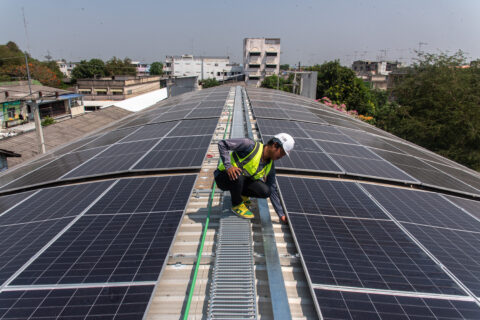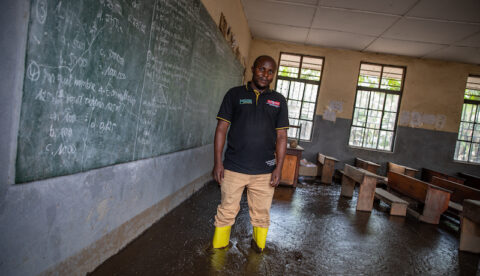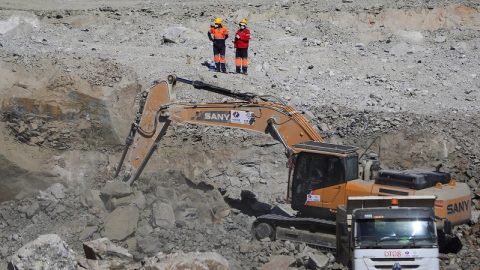People everywhere are struggling with the fatal impacts of worsening extreme heat, which is also damaging economies, widening inequalities and undermining green development, U.N. Secretary-General António Guterres said on Thursday.
Calling for global action to limit the devastating consequences, the head of the United Nations said “billions of people are facing an extreme heat epidemic – wilting under increasingly deadly heatwaves”.
Extreme-heat events have been getting more frequent, intense and longer-lasting in recent decades as a result of human-made climate change.
Guterres’ appeal comes as the record for the world’s hottest day was set twice on consecutive days this week, according to Europe’s Copernicus Climate Change Service. Monday beat Sunday, with the global average surface air temperature reaching 17.15 Celsius, as parts of the world sweltered through fierce heatwaves from the Mediterranean to Russia and Canada.
Guterres said the UN had just received preliminary data indicating that Tuesday “was in the same range”, which would make a third hottest straight day on record, if confirmed.
In a speech, he noted that heat – driven by “fossil fuel-charged, human-induced climate change” – is estimated to kill almost half a million people a year, about 30 times more than tropical cyclones.

United Nations Secretary-General Antonio Guterres speaks during the United Nations Climate Change Conference (COP28) in Dubai, December 1, 2023. COP28/Christophe Viseux/Handout via REUTERS
This year alone, extreme heat struck highly vulnerable communities across the Sahel region, killed at least 1,300 pilgrims in Mecca during Hajj and shut down schools across Asia and Africa affecting more than 80 million children.
“And we know it’s going to get worse. Extreme heat is the new abnormal,” Guterres added in his speech to journalists at UN headquarters in New York.
The Secretary-General’s “call for action” brings together ten specialised UN agencies for the first time in an urgent and concerted push to strengthen international cooperation in addressing extreme heat.
Focus on most vulnerable
Guterres listed four areas where greater efforts could be made to keep people, societies and economies safer from the negative consequences of rising global temperatures.
He emphasised the importance of “caring for the most vulnerable” – with those at greatest risk including poor people in urban areas, pregnant women, people with disabilities, the elderly, children, those who are sick and people who are displaced from their homes.
Households living in poverty often live in substandard homes without access to cooling, he added, appealing for a boost in access to low-carbon cooling and expanded use of natural measures – which include planting trees for shade – and better urban design, alongside a ramp-up of heat warning systems.
Workers also need more protection, he said, as a new report from the International Labour Organization warned that over 70 percent of the global workforce – 2.4 billion people – are now at high risk of extreme heat, especially in Asia-Pacific, Africa and the Arab States.
The UN is calling on governments to urgently review laws and regulations on occupational safety and health to integrate provisions for extreme heat, including the right to refuse working in extreme hot weather.
Energy transition and adaptation
A third area targeted by the UN for action is making economies and societies better able to withstand heat, through stronger infrastructure, more resilient crops, and efforts to ease the pressure on health systems and water supplies.
“Countries, cities, and sectors need comprehensive, tailored Heat Action Plans, based on the best science and data,” Guterres said.
Lastly, the UN chief urged stepped-up action to “fight the disease”, by phasing out fossil fuels “fast and fairly” including no new coal projects, with the aim of limiting global warming to 1.5C – a goal nearly 200 governments signed up to in the 2015 Paris Agreement.
“I must call out the flood of fossil fuel expansion we are seeing in some of the world’s wealthiest countries,” he emphasised. “In signing such a surge of new oil and gas licenses, they are signing away our future.”
The United States, Canada, Australia, Norway and the UK have issued two-thirds of the global number of oil and gas licences since 2020, according to research published by the International Institute for Sustainable Development this week.
‘Still time to act’
Commenting on the UN’s call to action, Alan Dangour, director of climate and health at Wellcome, a UK-based science foundation, noted that people working outside in physical jobs and those who cannot afford to adapt to rising heat are particularly exposed – but the effects are far broader.
“The levels of heat we now routinely see around the world put every part of society under extreme pressure, directly harming our health while also affecting food and water security and much of our vital infrastructures,” he said in a statement.
Speaking to journalists on Thursday, scientists convened by Wellcome said there are positive measures that can be taken to combat the problem of extreme heat, which can also bring wider social benefits.
UAE’s ALTÉRRA invests in fund backing fossil gas despite “climate solutions” pledge
For example, they explained that using community facilities as cooling centres can offer older people a place to chat or play cards, tackling social isolation and heat stress at the same time. Or adding shades with solar panels to market stalls can help women traders keep working on hot days while also providing free electricity for their businesses.
“There is still time for concerted action to save lives from the impacts of climate change, but we can no longer afford to delay,” Dangour said.
The UN’s call for action points out that existing tools to reduce the devastating consequences of extreme heat could be deployed with large and far-reaching effects. Guterres said the good news is that “there are solutions… that we can save lives and limit its impact”.
For example, a global scale-up of heat health warning systems could save more than 98,000 lives every year, according to the World Health Organization. And the rollout of occupational safety and health measures could avoid $361 billion a year in medical and other costs, the ILO has estimated.
The UN chief urged a “huge acceleration of all the dimensions of climate action” as global warming is currently outpacing efforts to fight it. That could start to change, he added, as heatwaves, impacts on public health and disasters such as Canada’s wildfires are now hitting the richest countries as well as poorer ones.
“The heat is being felt by those that have decision-making capacity – and that is my hope,” he said.
(Reporting and editing by Matteo Civillini and Megan Rowling)
The post UN chief appeals for global action to tackle deadly extreme heat appeared first on Climate Home News.
UN chief appeals for global action to tackle deadly extreme heat
Climate Change
Colombia proposes expert group to advance talks on minerals agreement
Colombia wants countries to discuss options for a global agreement to ensure that the extraction, processing and recycling of minerals – including those needed for the clean energy transition – don’t harm the environment and human wellbeing.
The mineral-rich nation is proposing to create an expert group to “identify options for international instruments, including global and legally-binding instruments, for coordinated global action on the environmentally sound management of minerals and metals through [their] full lifecyle”.
Colombia hopes this will eventually lead to an agreement on the need for an international treaty to define mandatory rules and standards that would make mineral value chains more transparent and accountable.
The proposal was set out in a draft resolution submitted to the UN Environment Assembly (UNEA) earlier this week and seen by Climate Home News. UNEA, which is constituted of all UN member states, is the world’s top decision-making body for matters relating to the environment. The assembly’s seventh session will meet in Kenya in December to vote on countries’ proposals.
Soaring demand for the minerals used to manufacture clean energy technologies and electric vehicles, as well as in the digital, construction and defence industries have led to growing environmental destruction, human rights violations and social conflict.
Colombia argues there is an “urgent need” to strengthen global cooperation and governance to reduce the risks to people and the planet.
Options for a global minerals agreement
The proposal is among a flurry of initiatives to strength global mineral governance at a time when booming demand is putting pressure on new mining projects.
Colombia, which produces emeralds, gold, platinum and silver for exports, first proposed the idea for a binding international agreement on minerals traceability and accountability on the sidelines of the UN biodiversity talks it hosted in October 2024.
Since then, the South American nation has been quietly trying to drum up support for the idea, especially among African and European nations.
Its draft resolution to UNEA7 contains very few details, leaving it open for countries to discuss what kind of global instrument would be best suited to make mineral supply chains more transparent and sustainable.
Does the world need a global treaty on energy transition minerals?
Colombia says it wants the expert group to build on other UN initiatives, including a UN Panel on Critical Energy Transition Minerals, which set out seven principles to ensure the mining, processing and recycling of energy transition minerals are done responsibly and benefit everyone.
The group would include technical experts and representatives from international and regional conventions, major country groupings as well as relevant stakeholders.
It would examine the feasibility and effectiveness of different options for a global agreement, consider their costs and identify measures to support countries to implement what is agreed.
The resolution also calls for one or two meetings for member states to discuss the idea before the UNEA8 session planned in late 2027, when countries would decide on a way forward.
No time to lose for treaty negotiations
Colombia’s efforts to advance global talks on mineral supply chains have been welcomed by resource experts and campaigners. But not everyone agrees on the best strategy to move the discussion forward at a time when multilateralism is coming under attack.
Johanna Sydow, a resource policy expert who heads the international environmental policy division of the Heinrich-Böll Foundation, said she had hoped that the resolution would explicitly call for negotiations to begin on an international minerals treaty.
“Treaty negotiations take a long time. If you don’t even start with it now, it will take even longer. I don’t see how in two or three years it will be easier to come to an agreement,” she told Climate Home.
Despite the geopolitical challenges, “we need joint rules to prevent a huge race to the bottom for [mineral] standards”. That could start with a group of countries coming together and starting to enforce joint standards for mining, processing and recycling minerals, she said.
But any meaningful global agreement on mineral supply chains would require backing from China, the world’s largest processor of minerals, which dominates most of the supply chains. And with Colombia heading for an election in May, it will need all the support it can get to move its proposal forward.
‘Voluntary initiative won’t cut it’
Juliana Peña Niño, Colombia country manager at the Natural Resource Governance Institute, is more optimistic. “Colombia’s leadership towards fairer mineral value chains is a welcome step,” she told Climate Home News.
“At UNEA7, we need an ambitious debate that gives the proposed expert group a clear mandate to advance concrete next steps — not delay decisions — and that puts the voices of those most affected at the centre. One thing is clear: the path forward must ultimately deliver a binding instrument, as yet another voluntary initiative simply won’t cut it,” she said.
More than 50 civil society groups spanning Latin America, Africa and Europe previously described Colombia’s work on the issue as “a chance to build a new global paradigm rooted in environmental integrity, human rights, Indigenous Peoples’ rights, justice and equity”.
“As the energy transition and digitalisation drive demand for minerals, we cannot afford to repeat old extractive models built on asymmetry – we must redefine them,” they wrote in a statement.
Main image: The UN Environment Assembly is hosted in Nairobi, Kenya. (Natalia Mroz/ UN Environment)
The post Colombia proposes expert group to advance talks on minerals agreement appeared first on Climate Home News.
Colombia proposes expert group to advance talks on minerals agreement
Climate Change
California Sanctions Stark Disparities in Pesticide Exposure During Pregnancy
If you’re young, pregnant and Latina, chances are you live near agricultural fields sprayed with higher levels of brain-damaging organophosphate pesticides.
A baby in the womb has few defenses against industrial petrochemicals designed to kill.
California Sanctions Stark Disparities in Pesticide Exposure During Pregnancy
Climate Change
DeBriefed 3 October 2025: UK political gap on climate widens; Fossil-fuelled Typhoon Ragasa; ‘Overshoot’ unknowns
Welcome to Carbon Brief’s DeBriefed.
An essential guide to the week’s key developments relating to climate change.
This week
Shattered climate consensus
FRACKING BAN: UK energy secretary Ed Miliband has announced that the government will bring forward its plans to permanently ban fracking, in a move designed to counter a promise from the hard-right Reform party to restart efforts to introduce the practice, the Guardian said. In the same speech, Miliband said Reform’s plans to scrap clean-energy projects would “betray” young people and future generations, the Press Association reported.
ACT AXE?: Meanwhile, Kemi Badenoch, leader of the Conservatives, pledged to scrap the 2008 Climate Change Act if elected, Bloomberg reported. It noted that the legislation was passed with cross-party support and strengthened by the Conservatives.
‘INSANE’: Badenoch faced a backlash from senior Tory figures, including ex-prime minister Theresa May, who called her pledge a “catastrophic mistake”, said the Financial Times. The newspaper added that the Conservatives were “trailing third in opinion polls”. A wide range of climate scientists also condemned the idea, describing it as “insane”, an “insult” and a “serious regression”.
Around the world
- CLIMATE CRACKDOWN: The US Department of Energy has told employees in the Office of Energy Efficiency and Renewable Energy to avoid using the term “climate change”, according to the Guardian.
- FOREST DELAY: Plans for Brazil’s COP30 flagship initiative, the tropical forests forever fund, are “suffer[ing] delays” as officials remain split on key details, Bloomberg said.
- COP MAY BE ‘SPLIT’: Australia could “split” the hosting of the COP31 climate summit in 2026 under a potential compromise with Turkey, reported the Guardian.
- DIVINE INTERVENTION: Pope Leo XIV has criticised those who minimise the “increasingly evident” impact of global warming in his first major climate speech, BBC News reported.
€44.5 billion
The cost of extreme weather and climate change in the EU in the last four years – two-and-a-half times higher than in the decade to 2019, according to a European Environment Agency report covered by the Financial Times.
Latest climate research
- Fossil-fuelled climate change caused around 36% of Typhoon Ragasa’s direct damage to homes and properties in southern China, according to a rapid impact attribution study | Imperial Grantham Institute – Climate Change and the Environment
- Some 86% of the global population are concerned about climate change, according to a survey of 280,000 people in 142 countries and regions | Climate Policy
- A global shift towards a “planetary health diet” could slash emissions and save tens of thousands of lives each day | EAT-Lancet Commission 2025 report
(For more, see Carbon Brief’s in-depth daily summaries of the top climate news stories on Monday, Tuesday, Wednesday, Thursday and Friday.)
Captured

Clean energy has met 100% of Great Britain’s electricity demand for a record 87 hours this year so far, according to new Carbon Brief analysis. This is up from just 2.5 hours in 2021 and 64.5 hours in all of 2024. The longest stretch of time where 100% of electricity demand was met by clean energy stands at 15 hours, from midnight on 25 May 2025 through to 3pm on 26 May, according to the analysis.
Spotlight
‘Overshoot’ unknowns
As the chances of limiting global warming to 1.5C dwindle, there is increasing focus on the prospects for “overshooting” the Paris Agreement target and then bringing temperatures back down by removing CO2 from the atmosphere.
At the first-ever Overshoot Conference in Laxenburg, Austria, Carbon Brief asks experts about the key unknowns around warming “overshoot”.
Sir Prof Jim Skea
Chair of the Intergovernmental Panel on Climate Change (IPCC) and emeritus professor at Imperial College London’s Centre for Environmental Policy
So there are huge knowledge gaps around overshoot and carbon dioxide removal (CDR). As it’s very clear from the themes of this conference, we don’t altogether understand how the Earth would react in taking CO2 out of the atmosphere.
We don’t understand the nature of the irreversibilities and we don’t understand the effectiveness of CDR techniques, which might themselves be influenced by the level of global warming, plus all the equity and sustainability issues surrounding using CDR techniques.
Prof Kristie Ebi
Professor at the University of Washington’s Center for Health and the Global Environment
There are all kinds of questions about adaptation and how to approach effective adaptation. At the moment, adaptation is primarily assuming a continual increase in global mean surface temperature. If there is going to be a peak – and of course, we don’t know what that peak is – then how do you start planning? Do you change your planning?
There are places, for instance when thinking about hard infrastructure, [where overshoot] may result in a change in your plan – because as you come down the backside, maybe the need would be less. For example, when building a bridge taller. And when implementing early warning systems, how do you take into account that there will be a peak and ultimately a decline? There is almost no work in that. I would say that’s one of the critical unknowns.
Dr James Fletcher
Former minister for public service, sustainable development, energy, science and technology for Saint Lucia and negotiator at COP21 in Paris.
The key unknown is where we’re going to land. At what point will we peak [temperatures] before we start going down and how long will we stay in that overshoot period? That is a scary thing. Yes, there will be overshoot, but at what point will that overshoot peak? Are we peaking at 1.6C, 1.7C, 2.1C?
All of these are scary scenarios for small island developing states – anything above 1.5C is scary. Every fraction of a degree matters to us. Where we peak is very important and how long we stay in this overshoot period is equally important. That’s when you start getting into very serious, irreversible impacts and tipping points.
Prof Oliver Geden
Senior fellow and head of the climate policy and politics research cluster at the German Institute for International and Security Affairs and vice-chair of IPCC Working Group III
[A key unknown] is whether countries are really willing to commit to net-negative trajectories. We are assuming, in science, global pathways going net-negative, with hardly any country saying they want to go there. So maybe it is just an academic thought experiment. So we don’t know yet if [overshoot] is even relevant. It is relevant in the sense that if we do, [the] 1.5C [target] stays on the table. But I think the next phase needs to be that countries – or the UNFCCC as a whole – needs to decide what they want to do.
Prof Lavanya Rajamani
Professor of international environmental law at the University of Oxford
I think there are several scientific unknowns, but I would like to focus on the governance unknowns with respect to overshoot. To me, a key governance unknown is the extent to which our current legal and regulatory architecture – across levels of governance, so domestic, regional and international – will actually be responsive to the needs of an overshoot world and the consequences of actually not having regulatory and governance architectures in place to address overshoot.
Watch, read, listen
FUTURE GAZING: The Financial Times examined a “future where China wins the green race”.
‘JUNK CREDITS’: Climate Home News reported on a “forest carbon megaproject” in Zimbabwe that has allegedly “generated millions of junk credits”.
‘SINK OR SWIM’: An extract from a new book on how the world needs to adapt to climate change, by Dr Susannah Fisher, featured in Backchannel.
Coming up
- 7 October: International Energy Agency (IEA) renewables 2025 report launch
- 8-10 October: World summit of Indigenous peoples and nature, Abu Dhabi, UAE
- 9-15 October: International Union for the Conservation of Nature (IUCN) 2025 congress, Abu Dhabi, UAE
Pick of the jobs
- UK government foreign, commonwealth and development office, senior climate policy adviser | Salary: CA$93,207. Location: Calgary, Canada
- Wellcome Trust, senior research manager, climate and health | Salary: £64,800. Location: London
- Bloomberg, product manager – climate, nature and sustainability regulations | Salary: Unknown. Location: London
DeBriefed is edited by Daisy Dunne. Please send any tips or feedback to debriefed@carbonbrief.org.
This is an online version of Carbon Brief’s weekly DeBriefed email newsletter. Subscribe for free here.
The post DeBriefed 3 October 2025: UK political gap on climate widens; Fossil-fuelled Typhoon Ragasa; ‘Overshoot’ unknowns appeared first on Carbon Brief.
-
Climate Change2 years ago
Spanish-language misinformation on renewable energy spreads online, report shows
-
Climate Change Videos2 years ago
The toxic gas flares fuelling Nigeria’s climate change – BBC News
-
Climate Change2 months ago
Guest post: Why China is still building new coal – and when it might stop
-

 Greenhouse Gases1 year ago
Greenhouse Gases1 year ago嘉宾来稿:满足中国增长的用电需求 光伏加储能“比新建煤电更实惠”
-

 Climate Change1 year ago
Climate Change1 year ago嘉宾来稿:满足中国增长的用电需求 光伏加储能“比新建煤电更实惠”
-
Greenhouse Gases2 months ago
Guest post: Why China is still building new coal – and when it might stop
-

 Carbon Footprint1 year ago
Carbon Footprint1 year agoUS SEC’s Climate Disclosure Rules Spur Renewed Interest in Carbon Credits
-
Renewable Energy3 months ago
US Grid Strain, Possible Allete Sale












